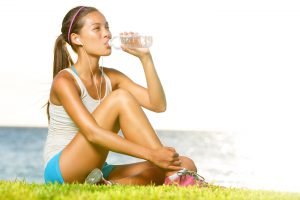Did you know that drinking water is the real key to losing weight? Well, not exactly. CNN says they have dug up some “serious evidence” that says drinking water or eating water-loaded fruits and vegetables when your stomach starts growling could help with weight management. The evidence, though, comes from a cross-sectional study in which the authors state “these data… cannot be used to infer causation.”
Chang and colleagues recognized that the relationship between weight status and hydration status is still relatively unknown. So, using data pulled from 2 recent National health and Nutrition Examination Surveys (NHANES), the researchers set out to see if there was an association between obesity and urine osmolality as a cursor of hydration status. No research had been conducted on this area of interest prior to this study, as urine osmolality was only added to the national survey in 2009. Additionally, the researchers only categorized study participants into two categories of weight: Body Mass Index (BMI) > 30 kg/m2 or BMI < 30 kg/m2 . So after combining the results from the 2009-2010 and 2011-2012 NHANES surveys, what did they find?
The University of Michigan researchers found that hydration status could be quantified as adequate over 800 mOsm/ kg or inadequate below 800 mOsm/ kg. The overall average urine osmolality was 631.4 mOsm/ kg, well below the adequate hydration marker. Hydration status was associated with age, race, sex, poverty level, and BMI in this study. They reported that adults who were inadequately hydrated had a mean BMI of 1.32 30 kg/m2 more than hydrated individuals. Additionally they stated that the odds of being obese were 1.59 times higher for inadequately hydrated individuals compared with hydrated individuals. Interestingly, about 68% of those who were classified as adequately hydrated were obese. The exact percentage of the 9,528 participants who fell about the BMI of 30 kg/m2 is never reported.
As this is not a causation study, the researchers inferred reasons for the lower hydration status of obese individuals but made only suggestions and educated guesses. Even in CNN citations, Chang states that it could just be because “a bigger person needs more water than a smaller person to stay hydrated.” This would make sense, as urine osmolality is measured in mOSM/ kg. In the study discussion, higher sodium intakes from “unhealthy” foods and increased metabolism of individuals with higher BMIs were cited as a possible causes for decreased hydration. Overall, the reasoning has not been researched, though Chang encouraged new studies in this area. Clinicians can also take this into consideration for counseling weight loss clients, although water intake as a weight loss tool is not an evidence based recommendation. As for individuals trying to lose weight, eating more fruits and vegetables with higher in general is a great idea and replacing soda and other sugar-sweetened beverages can definitely help with weight loss. Unfortunately, for now, there is no single key to weight loss as it involves changing a multitude of daily behaviors and habits.
